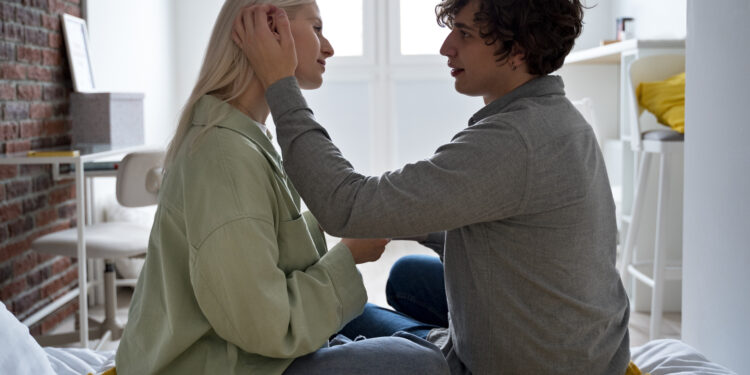Love for instance is believed to bring happiness, joy, and solutions to people’s problems in a relationship. But what if you get nervous even when you are happily in a relationship? Sometimes, it is possible to be anxious by healthy and good definition relationships or relationships that should make one happy.
Relational anxiety has been defined as worry or stress about the relationship regardless of the setting. I will write about good relationship anxiety and we will discuss whether anxiety happens in good relationships, the causes, and how to tell whether the problem originates from individual fear or a failed relationship.
Psychology’s Concept of Relationship Anxiety
Another concept is relationship anxiety which comprises excessive concern or fear about the relationship accompanied by apprehension or uncertainty as to its stability without actual evidence to support the feeling. Unlike symptoms of GAD, which may arise out of several spheres of human life activity, relationship anxiety is oriented to the subject’s romantic partnership. Especially, it is important to understand that the manifestation of relationship anxiety does not necessarily mean that the relationship is problematic, on the contrary, it can be rather strong, caring, and supportive.
Categorized among the usual signs are
Overthinking: Review conversations, activities, or instances with each other to triangulate indicators of issues in the partnership.
Fear of Abandonment: Feeling concerned that your partner might decide he or she no longer wants to be with you, even if there is no reason to feel that way.
Constant Doubt: Review your partner’s statements that they love you, will not leave, and did not mean what they said.
Since it is natural for one to develop anxiety in a relationship, worry and self-doubts arise, and if not contained the cycle may cause a strain to the relationship. Realizing that such feelings can happen in a healthy relationship makes it easier to decrease their intensity or eliminate them.
Why Can a Good Relationship Cause Anxiety?
In the best of relationships, some psychological and emotional factors cause anxiety, though. Here are some of the common reasons:
- Fear of Vulnerability
Admitting to them or being emotionally intimate with a partner overwhelms those who have issues with it. The level of closeness that characterizes healthy relationships entails vulnerability, which is alarming to people who get anxious because of the potential pain.
- Fear of Losing Something Good
It is true that for those who have had prior relationship trauma or some attachment problem, the idea of losing a relationship can be stressful. This makes them expect loss even in the absence of it; the happier the individual is in the relationship, the more likely they are to fear that the relationship will not last.
- Perfectionism and other unrealistic expectations are two major self-attributes that affect college students.
Those individuals who set high standards for performance and interpersonal relationships may feel forced into preserving an exemplary couple status. Since people try to make it right all the time, they may end up criticizing themselves, worrying, and feeling anxious all the time, even when everything is well between their partners.
- Excessive thinking and excessive analyzing
Cognitively loaded people often focus on every word or phrase, move, and deed in the relationship, hoping to find something sinister or at least suspicious. This can lead to unnecessary anxiety meaning that will interpret any situation that may look normal as a potential problem.
- Self-Doubt in Couples
Some people have such difficulties in trusting the love they are given that they have to develop inner conflicts. The phenomenon is familiar to many people and is said to be the outgrowth of the “imposter syndrome” which makes people wonder if they are not “worthy” of the position they occupy and experience stress and self-doubt.
These base feelings and cognitive processes can turn even a good relationship into something intimidating and cause people to doubt their feelings or, at the least, overthink their partners’ actions.
Social Phobias and self-medication in otherwise healthy relationships
In addition to psychological factors, certain relationship dynamics or external situations can trigger anxiety in otherwise stable partnerships:
Clinginess or Fear of Abandonment:
If one of the partners requires some space in the relationship, the other one might feel uncomfortable and emotionally threatened by the abandonment and rejection sensations.
Communication Breakdown:
In smaller breaches of etiquette, otherwise healthy people may start to worry, thinking that their discomfort means something much more sinister.
Future Uncertainty:
Issues like marriage or children create tension because the absence of willingness of one partner to talk about it can become a problem.
External Pressures:
Family pressures, workplace pressure, or financial issues can exert indirect influence over the relationship, which causes pressure over how such factors influence the partnership.
It is basic here to understand that familiarizing oneself with such triggers can assist reach a point of understanding amongst people of where the stimulation of anxiety may be coming from and therefore whether or not the routines are coming from the relationship or from elsewhere.
Understanding the Differences Between Anxiety Disorder and Relationship Problems
Therefore not all relationship anxiety signals trouble within the relationship. Here are some ways to distinguish personal anxiety from actual relationship concerns:
- External cues compared to Internal propels
Consider if your anxiety is personal (for example, fear of rejection, fear of abandonment, or low self-esteem) or relational (for example, unsatisfied needs, or ongoing disagreements).
- Pattern Recognition
Check to see if it comes up mostly at stages when it looks way too good to be real, or only when there are genuine problems present. Let’s take a closer look at a neat little paradox: relationship anxiety tends to occur when there is no actual cause for concern while real relationship issues always have apparent signs or causes.
- This can in a way affirm many fears that people have for example fears about vulnerability or trust.
If the idea of participating in this process, opens you up or to trust your partner, produces anxiety this could indicate more and deeper an individual’s fear than a relationship’s problem. In as much as people experiencing vulnerability may have their fears enacted in the relationship, they may also displace them into the relationship.
Knowing where your anxiety stems from will help you decipher if it’s as a result of low self-esteem or actual real concerns about the partnership. If the anxiety appears to originate out of ‘nowhere’ then it is probably internal issues and not the relationship.
Effects of Relationship Anxiety on You and Your Partner
It only shows that if anxiety is working in a relationship, it will work adversely in both people in either one or multiple ways.
On You
Daily relationship anxiety gives rise to guilt, stress, and doubts impacting one’s general health. One may even think or feel like they are overreacting or even doubt the worth of your existence in the relationship.
On Your Partner
Specific behaviors are also distressing such as over-dependence on reassurance or withdrawal from reciprocal interaction. It becomes possible your partner may feel pressured to reassure you continually of his/her love, which may result in erasure of space or the development of irritation in due course.
Long-Term Effects
If it causes constant tension, and anxiety when left untreated can lead to emotional burnout, miscommunication, or even the ending of the relationship. At some point, both partners may feel bored or distant due to unsettled concerns, and constant misunderstandings.
Long-term effects of relationship anxiety can therefore be avoided, which would go a long way in helping to improve the relationship you share with your partner.
Conclusion
In relationships ranging from healthy and loving, to couple therapy, anxiety can arise based on individual fear, previous experience, or relationship ethos. Unhealthy relationship anxiety is normal and it does not necessarily indicate that the relationship is problematic in any way.
The efficient analysis of your emotions and their patterns will help you to get more insights into the causes of your anxiety. Such feelings might be normal but in case they become intense, talking to a therapist should be greatly recommended because it will help one come to terms with them. Just realize that it is quite normal for people in healthy relationships to have confused feelings and that trying to work on it is a part of the way toward developing a healthy state of mind and a fully functional personality.
Remember, healthy relationships can involve complex feelings, and working through them is part of the journey toward emotional well-being and connection.



